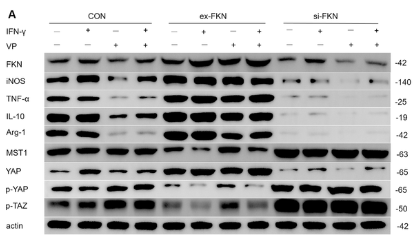CX3CL1 Antibody - #DF12376
| Product: | CX3CL1 Antibody |
| Catalog: | DF12376 |
| Description: | Rabbit polyclonal antibody to CX3CL1 |
| Application: | WB IHC IF/ICC |
| Cited expt.: | WB, IHC, IF/ICC |
| Reactivity: | Human, Mouse |
| Mol.Wt.: | 90-100 kDa; 42kD(Calculated). |
| Uniprot: | P78423 |
| RRID: | AB_2845181 |
Related Downloads
Protocols
Product Info
*The optimal dilutions should be determined by the end user. For optimal experimental results, antibody reuse is not recommended.
*Tips:
WB: For western blot detection of denatured protein samples. IHC: For immunohistochemical detection of paraffin sections (IHC-p) or frozen sections (IHC-f) of tissue samples. IF/ICC: For immunofluorescence detection of cell samples. ELISA(peptide): For ELISA detection of antigenic peptide.
Cite Format: Affinity Biosciences Cat# DF12376, RRID:AB_2845181.
Fold/Unfold
A 152E5.2; AB030188; ABCD 3; ABCD3; AI848747; C-X3-C motif chemokine 1; C3Xkine; Chemokine (C-X3-C motif) ligand 1; Chemokine C X3 C motif ligand 1; Chemokine CX3C Motif Ligand 1; CX3C membrane anchored chemokine; CX3C membrane-anchored chemokine; Cx3cl1; CXC 3; CXC3; CXC3C; D8Bwg0439e; FKN; Fractalkine; Neurotactin; NTN; NTT; Processed fractalkine; SCYD 1; SCYD1; Small inducible cytokine D1; Small inducible cytokine subfamily D (Cys X3 Cys) member 1; small inducible cytokine subfamily D (Cys-X3-Cys), member 1 (fractalkine, neurotactin); Small inducible cytokine subfamily D member 1; Small-inducible cytokine D1; X3CL1_HUMAN;
Immunogens
A synthesized peptide derived from human CX3CL1, corresponding to a region within the internal amino acids.
Expressed in the seminal plasma, endometrial fluid and follicular fluid (at protein level). Small intestine, colon, testis, prostate, heart, brain, lung, skeletal muscle, kidney and pancreas. Most abundant in the brain and heart.
- P78423 X3CL1_HUMAN:
- Protein BLAST With
- NCBI/
- ExPASy/
- Uniprot
MAPISLSWLLRLATFCHLTVLLAGQHHGVTKCNITCSKMTSKIPVALLIHYQQNQASCGKRAIILETRQHRLFCADPKEQWVKDAMQHLDRQAAALTRNGGTFEKQIGEVKPRTTPAAGGMDESVVLEPEATGESSSLEPTPSSQEAQRALGTSPELPTGVTGSSGTRLPPTPKAQDGGPVGTELFRVPPVSTAATWQSSAPHQPGPSLWAEAKTSEAPSTQDPSTQASTASSPAPEENAPSEGQRVWGQGQSPRPENSLEREEMGPVPAHTDAFQDWGPGSMAHVSVVPVSSEGTPSREPVASGSWTPKAEEPIHATMDPQRLGVLITPVPDAQAATRRQAVGLLAFLGLLFCLGVAMFTYQSLQGCPRKMAGEMAEGLRYIPRSCGSNSYVLVPV
Research Backgrounds
Acts as a ligand for both CX3CR1 and integrins. Binds to CX3CR1. Binds to integrins ITGAV:ITGB3 and ITGA4:ITGB1. Can activate integrins in both a CX3CR1-dependent and CX3CR1-independent manner. In the presence of CX3CR1, activates integrins by binding to the classical ligand-binding site (site 1) in integrins. In the absence of CX3CR1, binds to a second site (site 2) in integrins which is distinct from site 1 and enhances the binding of other integrin ligands to site 1. The soluble form is chemotactic for T-cells and monocytes and not for neutrophils. The membrane-bound form promotes adhesion of those leukocytes to endothelial cells. May play a role in regulating leukocyte adhesion and migration processes at the endothelium.
A soluble short 95 kDa form may be released by proteolytic cleavage from the long membrane-anchored form.
O-glycosylated with core 1 or possibly core 8 glycans.
Cell membrane>Single-pass type I membrane protein.
Secreted.
Expressed in the seminal plasma, endometrial fluid and follicular fluid (at protein level). Small intestine, colon, testis, prostate, heart, brain, lung, skeletal muscle, kidney and pancreas. Most abundant in the brain and heart.
Belongs to the intercrine delta family.
Research Fields
· Environmental Information Processing > Signaling molecules and interaction > Cytokine-cytokine receptor interaction. (View pathway)
· Environmental Information Processing > Signal transduction > TNF signaling pathway. (View pathway)
· Organismal Systems > Immune system > Chemokine signaling pathway. (View pathway)
References
Application: WB Species: Human Sample: ccRCC cell line 786-O and renal epithelial cel
Application: IF/ICC Species: Human Sample: ccRCC cell line 786-O and renal epithelial cel
Application: IHC Species: Human Sample: ccRCC cell line 786-O and renal epithelial cel
Application: WB Species: Mice Sample: J774A.1 cells
Application: IF/ICC Species: Mice Sample: J774A.1 cells
Application: WB Species: mouse Sample: J774A. 1 cells
Application: IHC Species: human Sample: liver
Application: WB Species: human Sample: OSCC cell
Application: WB Species: Mice Sample: Treg cells
Restrictive clause
Affinity Biosciences tests all products strictly. Citations are provided as a resource for additional applications that have not been validated by Affinity Biosciences. Please choose the appropriate format for each application and consult Materials and Methods sections for additional details about the use of any product in these publications.
For Research Use Only.
Not for use in diagnostic or therapeutic procedures. Not for resale. Not for distribution without written consent. Affinity Biosciences will not be held responsible for patent infringement or other violations that may occur with the use of our products. Affinity Biosciences, Affinity Biosciences Logo and all other trademarks are the property of Affinity Biosciences LTD.















